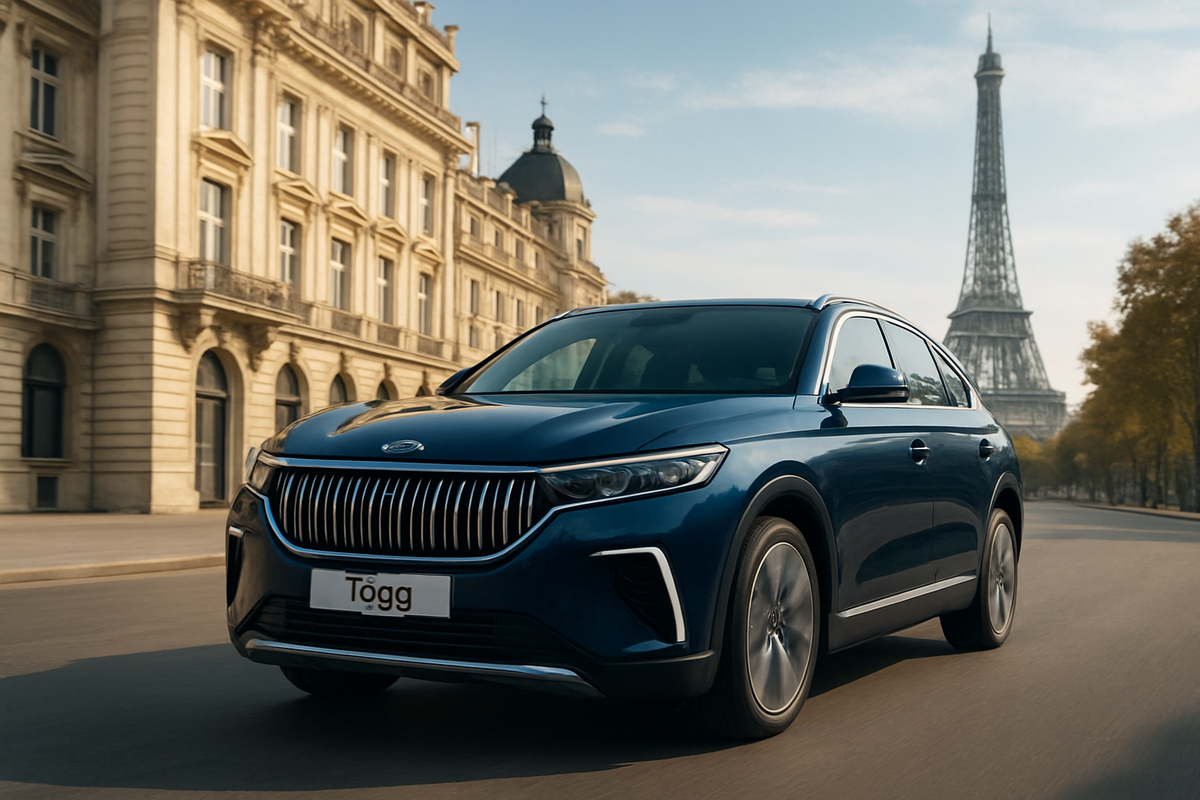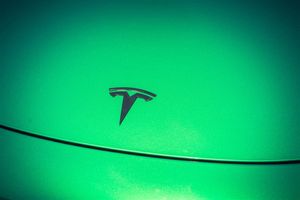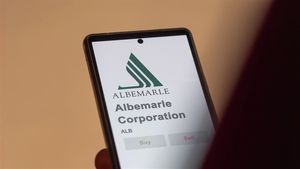
October 29, 2025 – Türkiye's pioneering electric vehicle (EV) manufacturer, Togg, officially marks a pivotal moment in its nascent history today, commencing sales in the highly competitive European market. This strategic expansion, occurring in the company's third year of operation, is not merely a commercial endeavor but a bold statement of Türkiye's intent to become a significant player in the global electrification and mobility landscape. Togg's entry is poised to send ripples across the European EV sector, intensifying competition, and potentially reshaping demand dynamics for crucial commodities like battery metals and the burgeoning charging infrastructure.
The move comes as the European Union tightens CO2 regulations, creating a fertile ground for new EV entrants. Togg, with its technologically advanced and competitively priced models, aims to capture a significant share, challenging both established automotive giants and emerging EV startups. This expansion underscores a broader shift in the automotive industry, where national champions are increasingly looking beyond domestic borders to scale production and secure a foothold in the rapidly evolving global EV ecosystem.
Togg's European Offensive: A Deep Dive into the Launch
Togg's journey to the European market has been meticulously planned since its inception. The company, a consortium of five major Turkish entities (TOBB, Anadolu Group, BMC, Zorlu Holding, and Turkcell), initiated mass production of its first C-segment SUV model, the T10X, in early 2023, following the inauguration of its Technology Campus on October 29, 2022. Building on this foundation, Togg unveiled its second model, the T10F fastback sedan, at CES 2024, signaling its intent for a broader product portfolio.
The crucial phase of its European market entry began with the T10F's domestic launch in Türkiye on September 15, 2025, followed swiftly by its debut in Germany on September 29, 2025. Germany was strategically chosen as the initial European launchpad, owing to its robust EV infrastructure, attractive governmental incentives for EV adoption, a significant Turkish diaspora, and its historical prominence in the automotive industry. Pre-orders for both the T10X and T10F models in Germany commenced on the same day, September 29, with an initial export of 100 vehicles to the country. Togg plans to escalate this to 1,000 units by the end of 2025, with deliveries to German customers anticipated to begin in January 2026. Following this initial push, Togg intends to gradually expand its footprint into other key European markets, including France and Italy.
A significant enabler for Togg's European ambitions is the five-star Euro NCAP safety rating achieved by both the T10X and T10F, a critical benchmark for consumer trust and acceptance in the continent. The vehicles are equipped with cutting-edge features, including advanced driver-assistance systems, AI-integrated vehicle management, and a sophisticated digital cockpit with large infotainment screens and high-speed internet connectivity. Togg's competitive pricing, starting from €34,295 in Europe, is further bolstered by Türkiye's customs union status with the EU, which provides a tariff advantage over non-EU competitors, particularly some Chinese EV manufacturers. Domestically, Togg has already proven its mettle, capturing approximately one in five EV sales in Türkiye in 2024 and maintaining a dominant 24% share of the battery electric vehicle market from January to May 2025.
Market Movers: Winners and Losers in Togg's Wake
Togg's assertive entry into the European EV market is set to trigger a dynamic reshuffling among various industry players. Legacy automakers like Volkswagen (XTRA: VOW3), Mercedes-Benz (XTRA: MBG), and Stellantis (NYSE: STLA), which are heavily invested in their own EV transitions, will face increased competitive pressure, particularly in the mid-range EV segment where Togg's models are positioned. Their ability to innovate, optimize pricing, and enhance their charging ecosystems will be crucial in fending off this new challenger. Similarly, new-age EV manufacturers such as Tesla (NASDAQ: TSLA) and various Chinese brands like BYD (OTCMKTS: BYDDF) and Nio (NYSE: NIO), which have been aggressively expanding in Europe, will find another formidable competitor vying for market share. Togg's tariff advantage and localized production for battery modules through its joint venture Siro could give it an edge over some non-EU imports.
On the winning side, the surge in EV production and sales driven by Togg's expansion will undoubtedly benefit suppliers of critical battery metals. Companies involved in the mining and processing of lithium, nickel, and cobalt are poised for increased demand. While Togg's battery systems are currently supplied by Siro, a joint venture with China's Farasis Energy, the overall market growth will create tailwinds for major global players in these commodities. Furthermore, Togg's long-term interest in developing boron-based battery technology, leveraging Türkiye's significant boron reserves, could eventually open new avenues for companies in that specific materials sector.
Charging infrastructure providers across Europe are also likely beneficiaries. While Togg has its own extensive Trugo network in Türkiye, its European strategy suggests partnerships and integration with existing charging networks. This could lead to increased utilization for companies like Ionity (a joint venture of several automakers), Allego (NYSE: ALLG), and EVgo (NASDAQ: EVGO), as well as national charging network operators. The expansion will necessitate further investment in public and private charging solutions, creating opportunities for hardware manufacturers, software providers, and installation services. Additionally, technology and software companies specializing in advanced driver-assistance systems (ADAS), infotainment, and connectivity solutions will find a growing market as Togg and its competitors continually seek to enhance vehicle intelligence and user experience.
Broader Implications: Reshaping the European EV Landscape
Togg's entry into Europe is not an isolated event but a significant development within the broader context of the accelerating global shift towards electric mobility. It underscores a growing trend of national automotive champions emerging from non-traditional manufacturing hubs, challenging the long-held dominance of established players. This event fits seamlessly into the narrative of diversification within the EV supply chain and the increasing geopolitical importance of battery technology and critical raw materials.
The potential ripple effects on competitors and partners are substantial. European legacy automakers, already grappling with the transition to EVs, will be compelled to further accelerate their innovation cycles and refine their pricing strategies to remain competitive. Togg's direct-to-consumer sales model and comprehensive service networks, mirroring strategies employed by companies like Tesla, could also pressure traditional dealerships to adapt. From a partnership perspective, Togg's approach to leveraging existing European charging networks rather than building out its own from scratch immediately, presents opportunities for collaboration and integration, potentially fostering a more interconnected EV ecosystem.
Regulatory and policy implications are also noteworthy. Togg's tariff-free access to the EU market due to Türkiye's customs union status highlights the importance of trade agreements in shaping competitive landscapes. This could prompt discussions or reviews of trade policies as other non-EU EV manufacturers seek similar advantages. Furthermore, Togg's commitment to safety (Euro NCAP 5-star rating) and advanced technology aligns with tightening European regulations, potentially setting new benchmarks for market entry. Historically, the automotive industry has seen numerous new entrants attempting to disrupt established markets, from Japanese manufacturers in the 70s and 80s to South Korean brands in the 90s and 2000s. Togg's trajectory could be compared to these precedents, demonstrating how focused national initiatives can successfully penetrate mature markets with competitive products.
The Road Ahead: Navigating Opportunities and Challenges
Looking ahead, Togg's European journey presents a myriad of short-term and long-term possibilities. In the short term, the company will focus on solidifying its presence in Germany, ensuring smooth deliveries starting in January 2026, and building brand recognition and customer trust. The success of its initial sales figures and customer satisfaction in Germany will be critical in determining the pace and scale of its expansion into other European countries like France and Italy. Togg will need to swiftly establish robust service and support networks, which are paramount for consumer confidence in a new automotive brand.
Long-term, Togg's vision of producing one million vehicles across five different models by 2030, including a C-hatchback, B-SUV, and B-MPV, indicates an ambitious growth trajectory. This will necessitate continuous investment in R&D, manufacturing capacity, and supply chain optimization. Potential strategic pivots might include further vertical integration, particularly in battery technology, beyond its Siro joint venture, especially if its research into boron-based batteries yields significant breakthroughs. The company might also explore regional manufacturing hubs within Europe if sales volumes warrant it, to further reduce logistics costs and strengthen its local presence.
Market opportunities will emerge in several areas. Togg's competitive pricing and advanced features could appeal to a wide segment of European consumers looking for value and technology. Its focus on a holistic "mobility ecosystem" could also differentiate it in a crowded market. However, significant challenges loom, including intense competition from well-established brands, fluctuating raw material prices, evolving regulatory landscapes, and the need to continually innovate to stay ahead of technological advancements. The expansion of charging infrastructure, while a collective effort, will also be a critical factor in Togg's growth, requiring seamless integration with existing networks and potentially targeted investments in underserved areas.
A New Chapter for European Mobility: The Enduring Impact of Togg
Togg's entry into the European market marks a significant inflection point, not just for the Turkish automotive industry but for the broader global EV landscape. The key takeaways from this event are multi-faceted: it validates Türkiye's ambitious industrial strategy, intensifies competition in the European EV market, and underscores the increasing importance of diversified supply chains for battery metals and charging infrastructure. Togg's success will be a testament to the viability of new entrants challenging established automotive powers, driven by strategic national support and a focus on competitive technology and pricing.
Moving forward, the market will closely assess Togg's performance in Germany, particularly its ability to meet delivery targets, build a loyal customer base, and manage its supply chain efficiently amidst global economic uncertainties. Investors should watch for Togg's sales figures, expansion into new European territories, and any announcements regarding its battery technology advancements, especially concerning boron-based solutions. The company's partnerships with charging network providers and its approach to after-sales service will also be crucial indicators of its long-term success.
Ultimately, Togg's European debut is more than just a new car brand entering a new market; it represents a powerful symbol of industrial ambition and technological progress. Its journey will undoubtedly shape competitive dynamics, drive further innovation, and contribute to the ongoing transformation of the European mobility sector for years to come.
This content is intended for informational purposes only and is not financial advice






